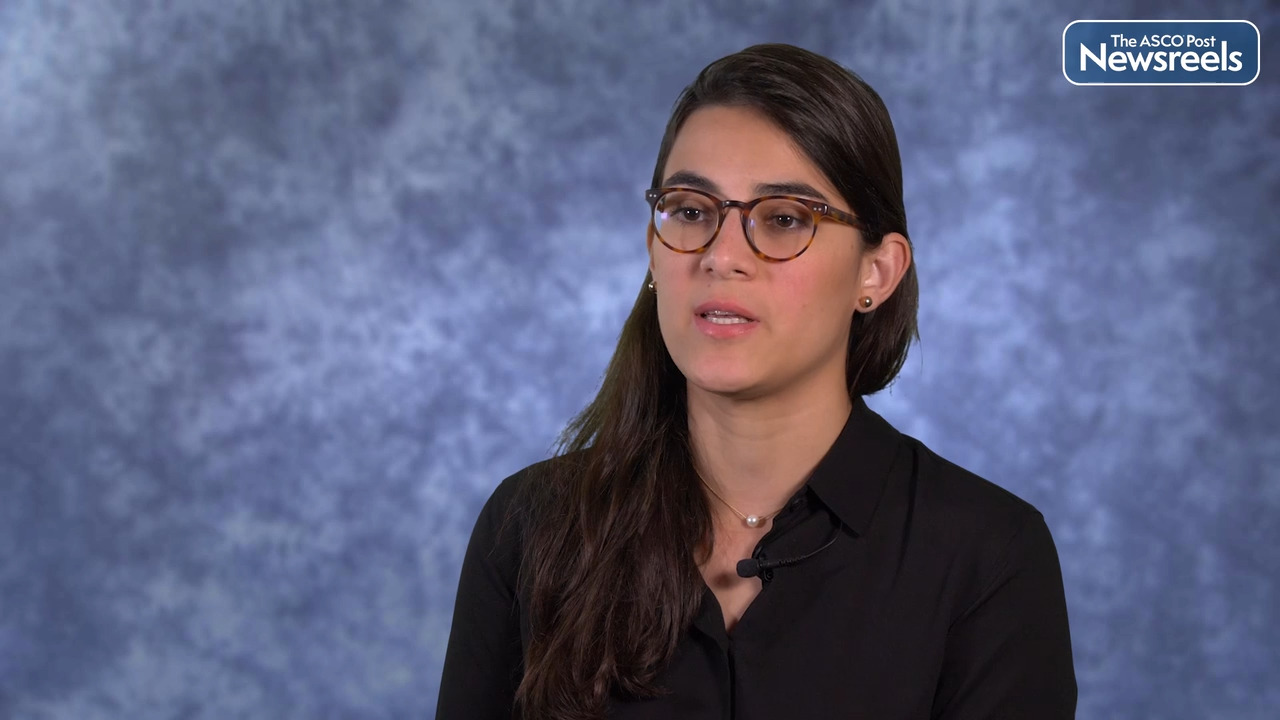Use of Remote Interventions Increased Adherence to Cancer Screenings Among Women in Rural Areas
Studies show that rural populations experience greater cancer disparities across the cancer control continuum—from prevention and incidence to survivorship and mortality—compared with their urban counterparts. Those living in rural parts of the United States also tend to have lower cancer screening ...
Regina Barragán-Carrillo, MD, on Breast Cancer Screening in the Transgender Population
Regina Barragán-Carrillo, MD, of Mexico’s National Institute of Medical Sciences and Nutrition Salvador Zubirán, discusses her findings showing that currently, physicians have limited knowledge about breast cancer screening in transgender patients. Were this topic addressed with widespread information, it could possibly reduce the health-care inequalities faced by this diverse group of patients (Abstract 71).
Silicone-Based Polyurethane Film May Reduce Acute Radiation Dermatitis in Patients With Breast Cancer
Mepitel Film—a silicone-based polyurethane film dressing—may be beneficial in reducing skin toxicities caused by radiation treatment, according to data presented during the October 2022 session of the ASCO Plenary Series by Chow et al (Abstract 390226). Results of the phase III trial showed the...
No Benefit for Adjuvant Palbociclib in Stage IIA Breast Cancer: Analysis From the PALLAS Trial
In a preplanned analysis of the PALLAS trial, the addition of adjuvant palbociclib to standard endocrine therapy did not improve outcomes over endocrine therapy alone in patients with stage IIA breast cancer. Palbociclib offered no additional benefit in terms of invasive disease–free survival (the...
Prevalence of and Risks for Thoracic Soft-Tissue Sarcomas in Breast Cancer Survivors
In a retrospective cohort study reported in The Lancet Oncology, Veiga et al found that receipt of radiotherapy was the strongest risk factor for development of thoracic soft-tissue sarcomas in U.S. breast cancer survivors; both hypertension and diabetes were significant risk factors for...
ASCO Launches Webinar Series to Close the Global Divide Between Survivorship and Palliative Care in Breast Cancer
In honor of Breast Cancer Awareness Month and World Hospice & Palliative Care Day, ASCO and its partners—the International Association for Hospice & Palliative Care; Tómatelo a Pecho, A.C.; the University of Miami Sylvester Comprehensive Cancer Center and Institute for Advanced Study of the ...
David Cescon, MD, PhD, Comments on the MONALEESA Analyses
David Cescon, MD, PhD, Clinician Scientist at the Princess Margaret Cancer Centre in Toronto, Canada, was the invited discussant of the two MONALEESA analyses.1,2 He noted that the most recent overall survival analysis, presented at the European Society for Medical Oncology (ESMO) Congress 2021,...
MONALEESA Analyses Show Widespread Benefit for Ribociclib in Hormone Receptor–Positive, HER2-Negative Breast Cancer
Further analyses of the MONALEESA metastatic breast cancer trials have shown that the benefit of ribociclib plus endocrine therapy in the first-line setting extends to most intrinsic molecular subtypes and is consistent across multiple subgroups. The studies were presented at the 2021 San Antonio...
MONALEESA-3: Ribociclib Plus Fulvestrant Improves Overall Survival Over Fulvestrant Alone in the First-Line Setting
In an updated analysis of the phase III MONALEESA-3 trial, which included postmenopausal patients with hormone receptor–positive, HER2-negative advanced or metastatic breast cancer, first-line treatment with ribociclib plus fulvestrant added nearly 16 months of overall survival time vs fulvestrant...
Expert Point of View: Debu Tripathy, MD
Debu Tripathy, MD, Professor and Chair of Breast Medical Oncology at The University of Texas MD Anderson Cancer Center, Houston, shared his thoughts on TROPiCS-02 with The ASCO Post. He said the study is important because it addresses the needs of “a population with limited options, whose...
TROPiCS-02 Sacituzumab Govitecan Effective in Hormone Receptor–Positive, HER2-Negative Metastatic Breast Cancer
For advanced breast cancer that is hormone receptor–positive and HER2-negative, sacituzumab govitecan-hziy significantly reduced the risk of disease progression by 34% over physician’s choice of treatment, based on the results of the phase III TROPiCS-02 trial.1 The heavily pretreated patients in...
Breast Cancer 2021–2022 Almanac
The past year has seen an unprecedented number of practice-changing advances across all three major breast cancer subtypes. For patients with early-stage triple-negative breast cancer, neoadjuvant chemotherapy plus pembrolizumab firmly entered the standard of care based on improvements in...
PALOMA-2: No Overall Survival Benefit Reported With Palbociclib/Letrozole in Advanced Breast Cancer
The final overall survival analysis of the phase III PALOMA-2 trial has shown no significant benefit for palbociclib given with letrozole, vs letrozole and placebo, as a first-line treatment in hormone receptor–positive, HER2-negative metastatic breast cancer.1 The results were reported at the 2022 ...
T-DXd Improves Progression-Free Survival vs T-DM1 in Metastatic HER2-Positive Breast Cancer
As reported in The New England Journal of Medicine by Javier Cortés, MD, PhD, of the International Breast Cancer Center, Barcelona, and colleagues, the phase III DESTINY-Breast03 trial has shown significantly prolonged progression-free survival with fam-trastuzumab deruxtecan-nxki (T-DXd) vs...
T-DXd Shows Efficacy Against Active Brain Metastases in HER2-Positive Breast Cancer
In the single-center phase II TUXEDO-1 trial of patients with advanced HER2-positive breast cancer, fam-trastuzumab-deruxtecan-nxki (T-DXd) showed efficacy in patients with active brain metastases, yielding intracranial responses in 73.3% of the population and a median progression-free survival of...
Expert Point of View: Patricia LoRusso, DO, PhD
Invited discussant Patricia LoRusso, DO, PhD, of Yale School of Medicine, said to the assembled audience at the 2022 ASCO Annual Meeting: “I see you are as excited about these data as I am,” after the applause ended following Dr. Modi’s presentation. “I want to thank our colleagues for helping to...
DESTINY-Breast04 Trial: T-DXd Significantly Improves Survival in Patients With HER2-Low Metastatic Breast Cancer
The antibody-drug conjugate fam-trastuzumab deruxtecan-nxki (T-DXd) doubled progression-free survival compared with chemotherapy alone in patients with “HER2-low” metastatic breast cancer—ie, patients with low levels of HER2 expression. The agent also extended overall survival for patients with low ...
Expert Point of View: Debu Tripathy, MD, and Hope S. Rugo, MD, FASCO
The ASCO Post asked Debu Tripathy, MD, Professor and Chair of Medical Breast Oncology at The University of Texas MD Anderson Cancer Center, Houston, and Hope S. Rugo, MD, FASCO, Professor of Medicine, Director of Breast Oncology and Clinical Trials Education at the University of California San...
Datopotamab Deruxtecan Shows Activity in Advanced Triple-Negative Breast Cancer
Datopotamab deruxtecan, an antibody-drug conjugate directed against trophoblast cell surface antigen-2 (Trop-2), is showing promise as a treatment for relapsed or refractory advanced triple-negative breast cancer, according to early findings from the phase I TROPION-PanTumor01 trial presented...
Addition of Pembrolizumab to Chemotherapy Improves Event-Free Survival in Triple-Negative Breast Cancer
As reported in The New England Journal of Medicine by Peter Schmid, MD, PhD, of Barts Cancer Institute, Queen Mary University of London, and colleagues, a preplanned interim analysis of the phase III KEYNOTE-522 trial has shown improved event-free survival with the addition of pembrolizumab to...
BEGONIA Trial Reports Activity With Datopotamab Deruxtecan Plus Durvalumab in Triple-Negative Breast Cancer
Preliminary results of the basket BEGONIA trial showed that the antibody-drug conjugate datopotamab deruxtecan (Dato-DXd), paired with the immune checkpoint inhibitor durvalumab, has strong activity in advanced or metastatic triple-negative breast cancer among patients not biomarker-selected for...
PADA-1 Trial: With Early Identification of ESR1 Mutation, Switch to Fulvestrant in Metastatic Breast Cancer
Switching from an aromatase inhibitor to fulvestrant upon early identification of the ESR1 mutation in plasma—before disease progression—doubled progression-free survival in the phase III PADA-1 trial, presented at the 2021 San Antonio Breast Cancer Symposium.1 “PADA-1 is the first trial to...
Expert Point of View: Angela DeMichele, MD, MSCE
Angela DeMichele, MD, MSCE, the Alan and Jill Miller Professor in Breast Cancer Excellence at the Perelman School of Medicine of the University of Pennsylvania in Philadelphia, commented on NIMBUS1 for The ASCO Post. She said obtaining information on tumor mutational burden is simple, as it is part ...
Dual Checkpoint Inhibitor Therapy Elicits Responses in Highly Mutated Breast Cancer
Patients with advanced HER2-negative metastatic breast cancer and high tumor mutational burden achieved responses—often durable—from treatment with the immunotherapy doublet of nivolumab and ipilimumab, according to results of the phase II NIMBUS trial reported at the 2021 San Antonio Breast Cancer ...
Expert Point of View: Mark E. Robson, MD
“OlympiA is clearly a practice-changing trial, and olaparib should be offered to patients meeting the entry criteria for the study,” said Mark E. Robson, MD, Chief of the Breast Medicine Service at Memorial Sloan Kettering Cancer Center, New York. Dr. Robson was invited to discuss the findings of...
OlympiA Trial: Adjuvant Olaparib Significantly Improves Overall Survival in Germline BRCA-Mutated Breast Cancer
The OlympiA trial of adjuvant olaparib in patients with HER2-negative, high-risk early-stage breast cancer and BRCA1 and BRCA2 mutations has now demonstrated a significant overall survival benefit, reducing the risk of death over placebo by 32% and yielding an absolute improvement of 3.8% at 3...
Strides Are Being Made in the Treatment of Brain Metastases From Breast Cancer
New drugs for HER2-positive breast cancer are able to overcome some of the obstacles that have made brain metastases challenging to treat, according to Mark Pegram, MD, the Susy Yuan-Huey Hung Professor of Oncology at Stanford University School of Medicine in California, who described the promising ...
EMERALD Trial: Oral Selective Estrogen Receptor Degrader as Second- or Third-Line Therapy for Advanced Breast Cancer
Use of the first investigational oral selective estrogen receptor degrader (SERD) elacestrant significantly reduced the risk of death or disease progression and lengthened progression-free survival compared with standard-of-care endocrine therapy with fulvestrant or an aromatase inhibitor in...
Aditya Bardia, MD, MPH, Comments on Findings From monarchE
The invited discussant of monarchE,1 Aditya Bardia, MD, MPH, Director, Breast Cancer Research, and Associate Professor of Medicine, Harvard Medical School, commented: “Based on a hazard ratio of 0.69 for invasive disease–free survival, the results are statistically significant and clinically...
Long-Term Follow-up of monarchE: Benefit of Abemaciclib Plus Endocrine Therapy Maintained in Early High-Risk Breast Cancer
Longer-term follow-up of the global phase III monarchE trial showed an increasing benefit for adding abemaciclib to endocrine therapy in the adjuvant treatment of early high-risk hormone receptor–positive, HER2-negative breast cancer, regardless of Ki67 index. The latest findings were reported at a ...
Long-Term Outcomes With Minimal-Access vs Conventional Breast Surgery in Stage 0 to III Breast Cancer
In a Chinese single-center, retrospective cohort, propensity score–matched analysis reported in JAMA Surgery, Wan et al found no difference in long-term outcomes, including distant metastasis–free and overall survival, with minimal-access breast surgery vs conventional breast surgery in women with...
Effect of Social Factors on Cancer Screening Rates Across U.S. Counties
Populations in U.S. counties defined as more vulnerable based on social factors—including socioeconomic status and racial and ethnic minority status—may be significantly less likely to receive timely breast, cervical, and colorectal cancer screenings, according to a recent study published by Bauer...
Eligibility for Lung Cancer Screening Among Women With a Smoking History Undergoing Breast Cancer Screening
In a single-center retrospective cohort study reported in JAMA Network Open, Titan et al identified the proportion of women with a history of smoking undergoing breast cancer screening with mammography who were eligible for low-dose computed tomography (CT) lung cancer screening, as well as the...
Switch to Fulvestrant/Palbociclib With Rising ESR1 Mutation Level in Blood During Aromatase Inhibitor/Palbociclib Therapy in Patients With Advanced Breast Cancer
As reported in The Lancet Oncology by François-Clément Bidard, MD, and colleagues, the French phase III PADA-1 trial has shown that switching to fulvestrant/palbociclib vs continuing first-line aromatase inhibitor (AI)/palbociclib therapy was associated with improved progression-free survival among ...
C-Reactive Protein Level and Cognitive Function in Breast Cancer Survivors Aged 60 and Older
As reported in the Journal of Clinical Oncology by Carroll et al, an analysis from the Thinking and Living with Cancer Study has shown higher levels of C-reactive protein (CRP) at baseline and during follow-up among women with stage 0 to III breast cancer diagnosed at age ≥ 60 years vs controls,...
Decrease in Breast Cancer Mortality Rate Continues, but Gap Persists for Black Women: From American Cancer Society Report
Although breast cancer death rates dropped by 43% from 1989 to 2020, Black women continue to be 40% more likely to die of the disease, despite a lower incidence, according to findings outlined in the American Cancer Society’s report Breast Cancer Statistics, 2022, and a companion study published by ...
ASCO Treatment Guidelines for HER2-Negative Metastatic Breast Cancer Updated to Reflect New Trastuzumab Deruxtecan Data
Just 1 month after the DESTINY-Breast04 data were presented at the 2022 ASCO Annual Meeting Plenary Session,1 an ASCO expert panel released updated guidance that endorses the adoption of the antibody-drug conjugate fam-trastuzumab deruxtecan-nxki (T-DXd) into clinical practice for patients with...
Expert Point of View: Meritxell Bellet Ezquerra, MD, PhD
TROPiCS-02 is a statistically positive trial, with the primary endpoint met and also now with an overall survival gain of 3.2 months,” said the study’s invited discussant Meritxell Bellet Ezquerra, MD, PhD, a senior researcher at the Vall d’Hebron Institute of Oncology, Barcelona. “TROPiCS-02 is...
TROPiCS-02: Sacituzumab Govitecan Improves Overall Survival in Hormone Receptor–Positive, HER2-Negative Breast Cancer
An overall survival benefit has now emerged for sacituzumab govitecan-hziy in women with previously treated, hormone receptor–positive/HER2-negative, locally recurrent, inoperable or metastatic breast cancer, according to a planned second interim analysis of the phase III TROPiCS-02 trial.1 The...
Living With Metastatic Breast Cancer
After my first breast cancer diagnosis, in 2010, the odds for a cure were seemingly all weighted in my favor. A routine mammogram screening had picked up a small—less than 1 cm—mass in my right breast, and a tissue biopsy confirmed it was stage I estrogen receptor–positive breast cancer. I had no...
Single vs Multiple Doses of Prophylactic IV Antibiotics to Prevent Surgical Site Infection in Implant-Based Breast Reconstruction
In a Swedish study reported in JAMA Network Open, Gahm et al found that multiple vs single doses of prophylactic intravenous (IV) antibiotics did not significantly reduce the risk of surgical site infection leading to implant removal in women undergoing implant-based breast reconstruction after...
Inflammatory Markers and Clinical Decline After Adjuvant Chemotherapy in Older Women With Breast Cancer
As reported in the Journal of Clinical Oncology by Ji et al, the HOPE study (Hurria Older Patients [HOPE] with Breast Cancer Study) has shown that older women categorized as robust prior to adjuvant chemotherapy are at risk for clinical decline postchemotherapy, with high baseline levels of the...
Association of Breast Cancer Recurrence in Patients Achieving pCR With vs Without Residual DCIS After Neoadjuvant Chemotherapy
In a retrospective analysis from the neoadjuvant I-SPY2 trial reported in JAMA Surgery, Osdoit et al found that among patients with breast cancer achieving pathologic complete response (pCR), there were no significant differences in treatment outcomes according to the presence or absence of...
Constitutional BRCA1 Methylation and Risk of Triple-Negative Breast Cancer and Ovarian Cancer
In a case-control study within the U.S. Women’s Health Initiative (WHI) study population reported in JAMA Oncology, Lønning et al found that BRCA1 promoter methylation identified in white blood cells was associated with increased risks of incident triple-negative breast cancer and high-grade serous ...
Marleen Kok, MD, PhD, on Triple-Negative Breast Cancer: Nivolumab Monotherapy or in Combination Therapy
Marleen Kok, MD, PhD, of The Netherlands Cancer Institute in Amsterdam, discusses the initial results from the BELLINI trial, which tested whether short-term preoperative nivolumab, either as monotherapy or in combination with low-dose doxorubicin or novel immunotherapy combinations, can induce immune activation in patients with early-stage triple-negative breast cancer with tumor-infiltrating lymphocytes (Abstract LBA13).
Unhealthy Gut May Set the Stage for Breast Cancer to Spread, Preclinical Research Reveals
An unhealthy gut triggers changes in normal breast tissue that may help breast cancer metastasize, according to new, early research from the University of Virginia (UVA) Cancer Center published by Feng et al in Cancer Immunology Research. The researchers found that when the gut microbiome is...
Laurence Buisseret, MD, PhD, on Triple-Negative Breast Cancer: Chemoimmunotherapy With or Without an Anti-CD73 Antibody
Laurence Buisseret, MD, PhD, of Belgium’s Institut Jules Bordet, discusses phase II results from the SYNERGY trial, which tested first-line chemoimmunotherapy of durvalumab, paclitaxel, and carboplatin with or without the anti-CD73 antibody oleclumab in patients with advanced or metastatic triple-negative breast cancer. Although adding oleclumab to durvalumab with chemoimmunotherapy did not increase the clinical benefit rate at week 24, research is ongoing to better understand the mechanisms of response and resistance to this study combination (Abstract LBA17).
Neoadjuvant Endocrine Therapy May Elicit Differential Responses in Black vs White Women With Breast Cancer
Black women treated with neoadjuvant endocrine therapy for breast cancer were more likely to benefit than White women if treated at an earlier disease stage, but less likely to benefit than White women if treated at a later disease stage, according to results presented at the 15th American...
Reporting of Hispanic Ethnicity and Race in Breast Cancer Studies: National Cancer Database Analysis
In a National Cancer Database (NCDB) analysis reported in a research letter in JAMA Oncology, Bazan et al found that Hispanic ethnicity was reported in patient demographics or results in less than half of studies in breast cancer, with a smaller proportion categorizing race and ethnicity into...
Costs of Cancer Treatment for Younger, Privately Insured Patients
A new, large study led by researchers at the American Cancer Society (ACS) and The University of Texas MD Anderson Cancer Center showed the rising costs of cancer treatment led to increases in total costs of care, and when compounded with greater cost-sharing, increased out-of-pocket costs for...



